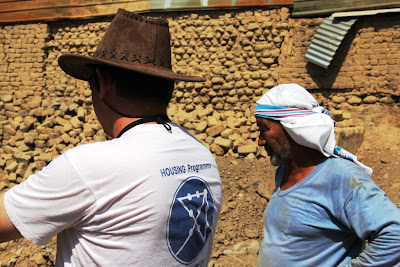Bags packed. The sky is dark. The birds have not bothered to sing. The driver awaits. Another day in the life of a travelling humanitarian. You recall the comments from the previous night on the Taftan, “With over 100 flights a year, I could eat only lentils, but I can’t be green”.
The dusty road traverses the roundabout, all traffic heading in one direction. The airport stands out, not for its size nor status, but for the mayhem that ensues. Bag in one hand, ticket in the other. Routine is familiar. The security machine beeps, but they wave you through. You wait in queue. You wait in queue.
The doors fly open, they say something in Russian. Everyone gets up, you follow through. On a bus to nowhere, not long enough to breathe more than thrice. They call out row by row, you wait til the end. All aboard. Doors close. Heat increases. You slowly roll. The roar of the engine isn’t what you expect. Not twin props today, a “new:” 15 year old Jet. It’s hot, darn hot. The windows are clouded. The plane is crowded. You taxi to the run way.
Without a moments pause, BOOM. The airplane is in full throttle. Rocking side to side, racing down the runway. Bump. Bump. And…. Silence. Smooth. The wings catch the air, and like the falcons that hunt the wolves, you’re stealthily creeping through the atmosphere.
Round and round, the plane turns. 180, 360, 540, 720 degrees. Up and up, like a spiral staircase. International airspace beckons, and finally you get there. From Osh over to the Uzbekistani Ferghana Valley, and now the flight begins to make purpose. Over the crops, over the pastures. Swathes of green and yellow patches. Is this where the Turkish get their inspiration for their rugs?
The valley falls away, rising green hills take its place. Not for much longer. Higher and higher, the plane creeps. Higher and higher, the mountains peak. Have you ever seen the land so tall?. Have you ever seen mountains touching the sky at all? The barrier between mountain, haze and sky disappears. You feel infinitesimally small. The Tien Shan, the impenetrable range, sits below you, so close you feel you could just walk out on to it. From this height, all the rugged rocks look smooth, like a carpet covering the world. It’s the dead of summer, and the peaks are snow capped. The depths and sizes of these Christmas like patches vary, larger and deeper on the shady side of the mountain.
The ice-cream peaks give way to the rolling green hills. The steppes are punctuated with veins and canals, carrying the life blood of Central Asia to its dependents. Thick, grey and rocky, these veins spread in every direction from the mountains. Flowing fast even at its lowest levels. The water is a never ending source of life, of conflict. Who’s first, who’s next. The rivers sway in a rhythmic motion, taking the blood of the mountains to far away lands. Canals tap the veins, straight lines tear through the landscape. Cotton was the future, and these canals feed nobody but das capitalist, not even Marx or Engels gets his feed. The borders are near, but the veins get thinner and thinner. Canal after canal, the rivers are tapped. Tick tock, the conflict has stopped?
Fields and fields, patches and patches. Tapestry of life is below. Cotton, corn, melon, cherries, wheat, apricots, and potatoes. Vroom vroom, they disappear. Like a stuntman, the plane rocks from left to right. The tarmac appears to be heading in the wrong direction. A handbrake turn at a thousand feet? The Ruske is mad, thinking he is in a Cessna, Messerschmitt or Tiger Moth. Bank hard to right. Drop hundreds of feet. Being pushed by the wind, left and right and back again. Straightening up, dropping like a stone… the heart waits to beat, while the hands hold the seat in front sturdily…
Thud, skid and slide… the plane hits the ground hard and the Ruske wrestles control. He doesn’t slow it down as it rushes past the black sheep, until the turnoff when he decides to taxi. You look around and notice Manas International Airport for what it is. Over a dozen herculean black planes lie the runway, gaping anuses you could drive a tank through, marked with U.S. in-signatories. This is the World’s Game of Chess, each team has chosen their colour. In Osh, lies a graveyard of white behemoths from the 1990s, wondering whether they will be re-instigated with Putin’s Fervour. And behind the gaping anuses of Manas, lie a second row of planes with more aerials than a Bangladesh apartment building.
You push through the wall of sound, “taxi taxi taxi”, you see the sign with your logo on it. Sergey my old man, glad to see you. “Offis?”, “Dah”. You take a deep breath, and you’re not sure whether you’re at your second home in Bishkek or whether you have no home.







